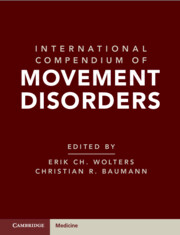Book contents
- International Compendium of Movement Disorders
- International Compendium of Movement Disorders
- Copyright page
- Contents
- Contributors
- International Compendium of Movement Disorders
- Hypo- and Hyperkinetic, Dyscoordinative and Otherwise Inappropriate Motor and Behavioral Movement Disorders
- Section 1: Basic Introduction
- Chapter 1 Behavior
- Chapter 2 The Basal Ganglia
- Chapter 3 The Role of the Cerebellum
- Chapter 4 Neuropathological Overview of Neurodegenerative Disorders
- Chapter 5 Genetic Models of Movement Disorders
- Chapter 6 Mitochondrial Movement Disorders
- Chapter 7 Metabolic Movement Disorders
- Chapter 8 Autoimmune Movement Disorders
- Chapter 9 Pediatric Movement Disorders
- Chapter 10 Neuro-Ophthalmology in Movement Disorders
- Chapter 11 Parkinson’s Disease
- Section 2: Hypokinetic Movement Disorders
- Section 3: Hyperkinetic Movement Disorders
- Section 4: Dyscoordinative and Otherwise Inappropriate Motor Behaviors
- Section 5: Objectifying Movement Disorders
- Movement Disorders in Vivo: Video Fragments
- Acronyms and Abbreviations
- Index
- References
Chapter 3 - The Role of the Cerebellum
from Section 1: - Basic Introduction
Published online by Cambridge University Press: 07 January 2025
- International Compendium of Movement Disorders
- International Compendium of Movement Disorders
- Copyright page
- Contents
- Contributors
- International Compendium of Movement Disorders
- Hypo- and Hyperkinetic, Dyscoordinative and Otherwise Inappropriate Motor and Behavioral Movement Disorders
- Section 1: Basic Introduction
- Chapter 1 Behavior
- Chapter 2 The Basal Ganglia
- Chapter 3 The Role of the Cerebellum
- Chapter 4 Neuropathological Overview of Neurodegenerative Disorders
- Chapter 5 Genetic Models of Movement Disorders
- Chapter 6 Mitochondrial Movement Disorders
- Chapter 7 Metabolic Movement Disorders
- Chapter 8 Autoimmune Movement Disorders
- Chapter 9 Pediatric Movement Disorders
- Chapter 10 Neuro-Ophthalmology in Movement Disorders
- Chapter 11 Parkinson’s Disease
- Section 2: Hypokinetic Movement Disorders
- Section 3: Hyperkinetic Movement Disorders
- Section 4: Dyscoordinative and Otherwise Inappropriate Motor Behaviors
- Section 5: Objectifying Movement Disorders
- Movement Disorders in Vivo: Video Fragments
- Acronyms and Abbreviations
- Index
- References
Summary
This chapter provides an overview of the basic features of the macroscopic and microscopic anatomy, physiology and potential functioning of the human cerebellum. Apart from its certain role in movement control by coordinating complex movements, additional hypotheses on the role of the cerebellum in adapting, conditioning and learning, or automating, movements are described. Views that portray the cerebellum as a timing device or as a structure that serves to optimize the quality of sensory input are also mentioned. As the cerebellum not only participates in movement control, understanding and appreciating its functioning may also explain its role in cognition, emotion, and autonomic functions. Finally, cerebellar disorders and clinical manifestations of cerebellar dysfunction in movement control are discussed.
Keywords
- Type
- Chapter
- Information
- International Compendium of Movement Disorders , pp. 35 - 52Publisher: Cambridge University PressPrint publication year: 2025

